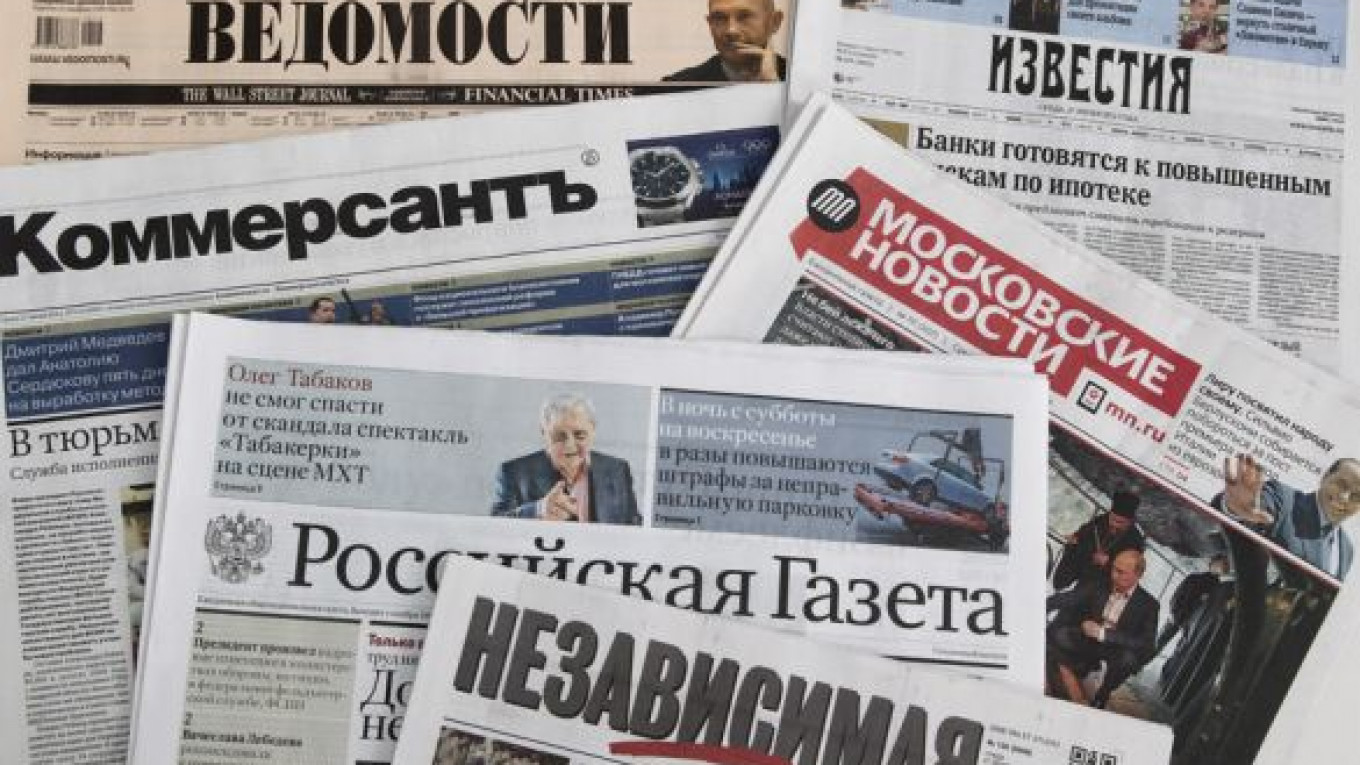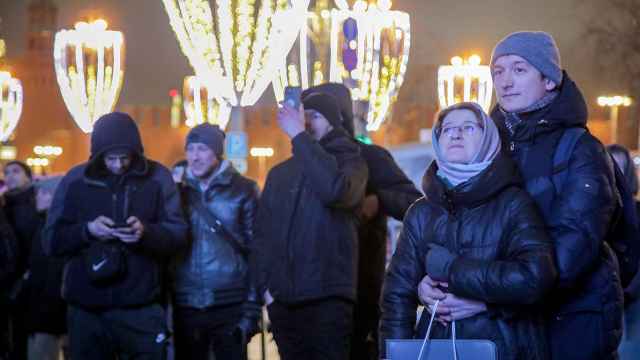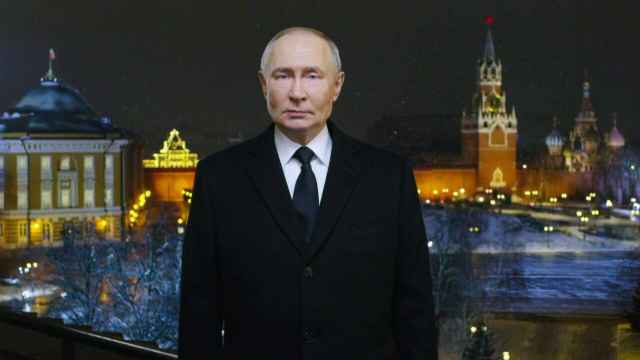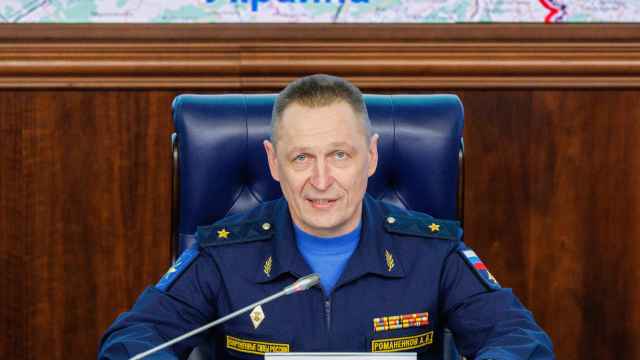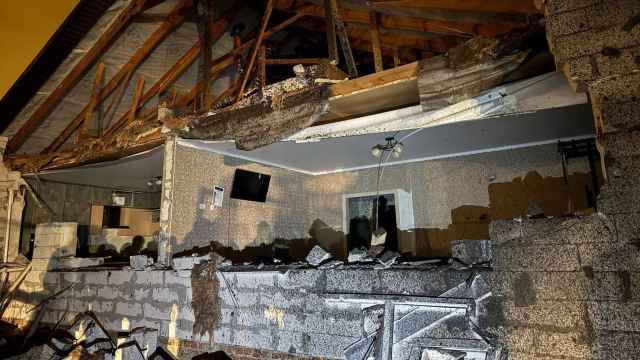An earlier version of What The Papers Say, Jan 28., incorrectly referred to the National Anti-Corruption Committee as the National Anti-Terrorism Committee in a summary of Mikhail Solotin's article headlined "As green as grass," which appeared in Nezavisimaya Gazeta. Time of update: 12:46 p.m.
Kommersant
1. Nikolai Sergeyev article headlined "Vladimir Kekhman reaches level of voluntary settlement" says the Bank of Moscow has reached a voluntary settlement with Vladimir Kekhman, co-owner of the JFC group that did not return two loans to the bank; pp 1, 4 (680 words).
2. Dmitry Butrin article headlined "Long-term strategy lacks time" says it will take the Russian government more time to consider the long-term fiscal policy. The Economic Development Ministry wants to revise tariffs for state monopolies, while the Finance Ministry wants to reduce the funding of state programs by 10 percent; pp 1-2 (793 words).
3. Ksenia Leonova and Svetlana Dementiyeva article headlined "Bitcoin" says the Russian Central Bank has warned that all transactions using bitcoins and other virtual currency will be treated as suspicious and potentially involved in money laundering; pp 1, 8 (629 words).
4. Vladislav Novy article headlined "Do not buy anything more expensive that 150 euros" comments on the Russian government restrictions on the import of parcels worth more than 150 euros without paying import duties. The measure is expected to affect on-line trade in Russia; goods will be sent to the country via its Customs Union partner, Kazakhstan, having more lenient regulations; pp 1, 7 (596 words).
5. Alexei Shapovalov article headlined "Investments do not show good growth" says no prospects for economic growth are seen in Russia and the weakening ruble aggravates the situation with attracting foreign investments; p 2 (524 words).
6. Ivan Safronov and Sergei Goryashko article headlined "Bangladesh to learn to fly" says Bangladesh is buying 24 Yak-130 Russian aircraft for more than $800 million; p 2 (489 words).
7. Anna Perova and Musa Muradov report headlined "Nothing against Alexander Tkachev" says Russian investigators have refused to initiate a case against Krasnodar region governor Alexander Tkachev over his statement, made in 2012, in which he voiced concern over the high presence of North Caucasus natives in the region; p 2 (450 words).
8. Andrei Kolesnikov article headlined "This day of siege" reports on President Vladimir Putin's visit to St. Petersburg to mark the 70th anniversary of lifting the World War II blockade of Leningrad; p 3 (675 words).
9. Natalia Gorodetskaya article headlined "Anti-terror bills get special opinion" says that the Public Chamber has approved a set of draft laws designed to tighten the antiterrorism legislation, despite the fact that the Law Enforcement Effectiveness Monitoring Institute under the chamber called these bills unconstitutional; p 5 (500 words).
10. Ivan Buranov article headlined "Diplomats and judges stripped of road immunity" says the Russian traffic police are to stop foreign diplomats and Russian judges driving their vehicles with gross violations of safety regulations; p 6 (597 words).
11. Maxim Yusin and Sergei Strokan article headlined "Maidan reaches Ukrainian parliament" says the Ukrainian parliament will look for a way out of the political crisis today, as President Viktor Yanukovych is trying to reach a compromise with the opposition; p 6 (692 words).
12. Ilya Barabanov article headlined "Opposition takes government places" says Ukrainian opposition activists are seizing more and more government office buildings in Kiev; p 6 (649 words).
13. Olga Kuznetsova interview with a Ukrainian businessman and lawmaker representing the Party of Regions, saying that the east of the country does not support Kiev opposition protests; p 6 (423 words).
14. Maria Yefimova article headlined "PACE goes under female control" says Moscow is disappointed with the new PACE head, a politician from Luxembourg, who is believed to be an advocate of democratic principles and is expected to criticize Russia; p 6 (612 words).
Nezavisimaya Gazeta
1. Anastasia Bashkatova article headlined "Russian economy falls into new normal state" comments on the statement by Economic Development Minister Alexei Ulyukayev who called the situation close to stagnation a normal state of the Russian economy. The government is getting ready for the privatization of some state assets as it, obviously, expects the economic situation to worsen; pp 1, 4 (809 words).
2. Tatyana Ivzhenko article headlined "Ukraine may be shifted to state of emergency" says if the Ukrainian parliament fails to ease political tension at its meeting today, the state of emergency may be imposed in Kiev; pp 1, 6 (1,384 words).
3. Yury Panyev article headlined "Conversation in Brussels to be short" says the Russian-EU summit to be held in Brussels today is going to be record short and last for one day only. Experts attribute this change in the format to the Russian-EU disagreement over Ukraine; pp 1, 3 (824 words).
4. Ivan Rodin and Alexandra Samarina article headlined "State Duma heads towards acceleration and simplification" says the planned amendments to the State Duma regulations will strip the opposition of the right to come up with legislative initiatives; pp 1, 3 (773 words).
5. Grigory Mikhaylov article headlined "Golden referendum" says the Kyrgyz parliament wants to nationalize a gold mining company belonging to Canadian investors; pp 1, 6 (745 words).
6. Daria Tsilyurik article headlined "Edward Snowden demands amnesty" says U.S. whistleblower Edward Snowden is ready to return to the U.S. if he does not face prosecution in his home country. However, the secret services are waging a campaign to damage his reputation and portray him as a spy; pp 1, 7 (841 words).
7. Editorial headlined "Is Maidan [Ukrainian opposition protest] possible in Russia?" says recent public opinion polls have shown that protest activity has decreased in the country compared to 2011. However, protests against illegal migration or ethnic problems are still possible; p 2 (479 words).
8. Sergei Konovalov article headlined "Carte Blanche. Dozhd television action causes storm of protest" says web users are expressing indignation over a show broadcast by the Dozhd television channel, in which it questioned the reasons for protecting Leningrad during World War II; p 3 (638 words).
9. Alina Terekhova article headlined "South Stream becomes increasingly important" says the Ukrainian unrest is jeopardizing Russian gas supplies to Europe, as anonymous threats to explode gas pipelines have been made. The crisis in Ukraine may help Russia's progress in the talks over the construction of the South Stream gas pipeline; p 4 (642 words).
10. Mikhail Solotin article headlined "As green as grass" reports that the National Anti-Corruption Committee has asked law-enforcement agencies to check information about possible kickbacks in the Federal Agency for Youth Affairs; p 5 (1,050 words).
Vedomosti
1. Margarita Lyutova article headlined "Government not to reject private initiative" says Russian officials may get a right to distribute concession agreements without tenders currently required by the law; pp 1, 5 (600 words).
2. Yulia Orlova and Daria Borisyak article headlined "It is not ruble that becomes cheaper" says experts are estimating that Russian exporters' revenues will grow by 5 to 12 percent thanks to depreciating ruble; pp 1, 14 (700 words).
3. Editorial headlined "Migrants and investment" notes that while the Russian authorities are trying to pretend to tackle the illegal migration problem, large number of migrants are hired for large-scale state construction projects funded by the state. The article calls for revising the migration policy; pp 1, 6 (400 words).
4. Lilia Biryukova and Maxim Tovkaylo article headlined "Replacement for Seliger being searched for" says that the pro-Kremlin youth camp Seliger is losing popularity due corruption scandals. The participation of President Vladimir Putin in the event next summer is in question; p 2 (450 words).
5. Another editorial headlined "Directors here and there" says officials are going to manage state-controlled corporations again, after Prime Minister Dmitry Medvedev said he wanted to replace them with professional businessmen; p 6 (300 words).
6. Polina Khimshiashvili interview with Norwegian Foreign Minister Boerge Brende speaking on Norway's relations with Russia, Moscow's claim to the Arctic natural resources and the upcoming Sochi Olympics; pp 8-9 (1,300 words).
7. Konstantin Simonov, head of the Russian National Energy Security Foundation, provides his opinion on the future of Ukraine in his column headlined "Divorce in Ukrainian style"; p 7 (400 words).
Izvestia
1. Alexandra Bayazitova article headlined "Government to make state companies more transparent" says the Russian government wants to oblige state-controlled corporations to make annual reports on their activity in social sphere; pp 1, 4 (476 words).
2. Alena Sivkova article headlined "Young Guards activists call Alexei Navalny to account" says United Russia's Young Guards movement has appealed to the prosecutor-general and the Investigative Committee to carry out a probe into information about Alexei Navalny's theft of 100 million rubles ($2.9 million) from the now defunct liberal Union of Right Forces party during the State Duma election in 2007; pp 1, 4 (533 words).
3. Anastasia Kashevarova interview with Chechnya head Ramzan Kadyrov speaking on the development of the republic and the fight against terrorism; pp 1, 5 (3,528 words).
4. Alexei Krivoruchek article headlined "Submarines to become invisible" says Russian submarines will get a special high-tech cover making it three times harder for radars to track them; pp 1, 4 (426 words).
5. Sergei Podosenov article headlined "Andrei Ksenzov to stand for Novosibirsk mayoral election from Motherland party" says former deputy governor of Novosibirsk Region Andrei Ksenzov will be nominated by the Motherland party to take part in the Novosibirsk mayoral election; p 2 (609 words).
6. Sergei Roganov article called "Maidan-obsessed Moscow" criticizes Russian Facebook users' attitude to the Ukrainian unrest, adding that Russia will have to make its own steps to resolve the Ukrainian crisis; p 9 (650 words).
Rossiiskaya Gazeta
1. Timofei Borisov interview with Emergency Situations Minister Vladimir Puchkov called "Extremely fast" speaking on rescuers' work in 2013 and making forecast for emergency situations in 2014; pp 1, 6 (3,013 words).
2. Tatyana Zamakhina article headlined "Governors' chance" says the fund for civil society development, which has close ties with the Kremlin, has published a rating of the effectiveness of Russian governors' work. The author notes that the document hints what governors are not going to be re-elected after their term in office expires; p 2 (407 words).
3. Nadezhda Yermolayeva interview with the Chinese ambassador to Russia speaking on the upcoming Sochi Olympics and the Chinese delegation to take part in the event; p 3 (1,105 words).
4. Yury Snegirev article headlined "Hit them! Rescue them!" gives an eyewitness's account of the situation in Kiev; p 8 (653 words).
5. Pavel Dulman interview with a Ukrainian lawmaker from the Party of Regions, who speaks on the upcoming parliamentary sessions where deputies will try to come to a compromise with the opposition to resolve the political crisis in the country; p 8 (637 words).
Moskovsky Komsomolets
1. Mikhail Rostovsky article headlined "High time to stop blaming authorities alone" analyses problems of the Russian opposition and concludes that the so-called creative class was using ideas of the early 20th century for their anti-government protests in 2012; pp 1, 4 (2,612 words).
2. Yekaterina Petukhova article headlined "You need blood? We will shed it" comments on the ideas that ultra-right activists among Ukrainian opposition protesters adhere to; pp 1, 3 (1,129 words).
3. Irina Badmayeva et al. report headlined "Holes in budget patched up with ruble" says the Russian authorities are deliberately lowering the ruble rate to cope with the budget deficit. Experts predict the ruble to lose even more value; pp 1, 4 (1,305 words).
4. Marina Ozerova article headlined "Peculiarities of national sex: Anyone is harmful" says Russian gay activists have appealed to the European Court of Human Rights complaining against the law banning gay propaganda. Meanwhile, a bill banning propaganda of any type of sex among minors in Russia has been submitted to the State Duma; pp 1, 3 (676 words).
5. Mikhail Zubov and Marina Ozerova article headlined "Yanukovych's fork: Will state of emergency be imposed in Ukraine" polls Ukrainian political experts who give their forecast for the further development of the political crisis in the country; p 3 (870 words).
RBK Daily
1. Tatyana Ternovskaya et al. report "Bureaux of exchange being stormed" says that against a backdrop of the ruble losing its value, Russians are buying dollars and euros en masse; pp 1, 7 (800 words).
2. Yulia Sinyayeva report "Farewell, offshore" says that the Finance Ministry has drafted a plan of the deoffshorization of the Russian economy in 2014; pp 1, 3 (800 words).
3. Ivan Petrov report "Biryulevo's sound" says that Interior Minister Vladimir Kolokoltsev has criticized the work of top officers of the Moscow police at a board meeting of the Interior Ministry main directorate for Moscow; pp 1-2 (700 words).
4. Yulia Sinyayeva et al. report "Argument about thousand billion" says that protest leader Alexei Navalny's Foundation for Fighting Corruption has estimated the Sochi Olympics at 1,500 billion rubles ($43.2 billion); p 2 (750 words).
Noviye Izvestia
1. Article by UN Secretary-General Ban Ki-moon "'We cannot build future failing to remember past'" in which he speaks about the Holocaust; pp 1-2 (650 words).
2. Sergei Putilov report "'Wooden [ruble] swims to the bottom'" says that the Russian ruble continues to depreciate, but the authorities do not seem to intend to save it; pp 1, 3 (600 words).
3. Yana Sergeyeva report "Phantom chance for peace" says that the Ukrainian parliament will hold an extraordinary session today to try and solve the crisis in the country; pp 1-2 (800 words).
4. Vera Moslakova report "March of support" says that the organizers of the March for Freedom in support of Bolotnaya case defendants have said that they will hold it in the format of a march, not a rally as the Moscow city authorities have suggested. In this case, clashes with police are quite possible, the article says; p 2 (600 words).
5. Artyom Lunkov report "What ordinary person does not need" says that the Public Chamber has suggested that "online militia" be set up to protect people from terrorism; p 2 (550 words).
6. Arina Raksina report "Off-hour situation" says that Russia's major car producer AvtoVAZ will sack thousands of workers to "optimize the production"; p 3 (500 words).
Komsomolskaya Pravda
1. Yelena Krivyakina report "Terrorists will be controlled with help of Glonass" says that a special inter-departmental commission aiming to prevent crimes with the help of the Glonass system will be set up; p 2 (200 words).
2. Anastasia Koretska report "'I know that in America they will gladly shoot me in the head" looks at Edward Snowden's first television interview from Russia; p 3 (350 words).
3. Alexander Kots report "Maidan has its own al-Qaida" tries to find out who is involved in protests in Kiev; pp 6-7 (2,400 words).
4. Oleg Potapov report "Blogger as instrument of staff wars" says that the hacker group Anonymous has posted in the internet a list of opposition activist Alexei Navalny's contacts; p 8 (500 words).
Trud
1. Sergei Ilchenko report "It may explode on the scale of Chernobyl" says that the situation in Ukraine is becoming explosive. Article features comments of Russian experts; pp 1-2 (1,500 words).
Krasnaya Zvezda
1. Alexander Alexanderov report "Chaos of democracy" looks at the situation in Ukraine; pp 1, 3 (1,700 words).
Jan. 18, 2014 / BBC Monitoring / ©BBC
A Message from The Moscow Times:
Dear readers,
We are facing unprecedented challenges. Russia's Prosecutor General's Office has designated The Moscow Times as an "undesirable" organization, criminalizing our work and putting our staff at risk of prosecution. This follows our earlier unjust labeling as a "foreign agent."
These actions are direct attempts to silence independent journalism in Russia. The authorities claim our work "discredits the decisions of the Russian leadership." We see things differently: we strive to provide accurate, unbiased reporting on Russia.
We, the journalists of The Moscow Times, refuse to be silenced. But to continue our work, we need your help.
Your support, no matter how small, makes a world of difference. If you can, please support us monthly starting from just $2. It's quick to set up, and every contribution makes a significant impact.
By supporting The Moscow Times, you're defending open, independent journalism in the face of repression. Thank you for standing with us.
Remind me later.


